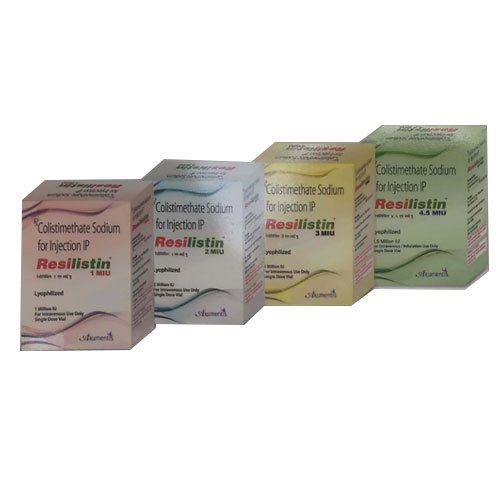
Colistin Injection: A Life-Saving Antibiotic for Serious Infections
Posted on March 27, 2025
In the ever-changing world of medicine, antibiotics are crucial in treating bacterial infections. Among these, Colistin (also referred to as polymyxin E) has emerged as a vital drug, particularly when it comes to multidrug-resistant (MDR) infections. In this blog, we are going to discuss Colistin injection, its applications, advantages, disadvantages.
What is Colistin Injection?
Colistin injection is an antibiotic that is employed to treat life-threatening infections that are caused by bacteria, especially those that are resistant to a wide range of other antibiotics. Colistin is a member of a class of antibiotics called polymyxins, and it kills bacteria by interfering with their cell membrane, causing them to die. This action makes Colistin extremely effective against Gram-negative bacteria such as Pseudomonas aeruginosa, Acinetobacter baumannii, and Klebsiella pneumoniae, which are notorious for causing severe infections.
Colistin is usually reserved for the treatment of infections that cannot be treated by other antibiotics because they are resistant, and therefore, it is a very important drug in combating antimicrobial resistance (AMR).
When to Use Colistin Injection
Colistin injection is generally used in serious infection cases, such as:
Pneumonia: Lung infections, particularly hospital-acquired or ventilator-associated pneumonia due to resistant bacteria.
Urinary Tract Infections (UTIs): Serious UTIs due to resistant bacteria that do not yield to other antibiotics.
Bloodstream Infections: Sepsis or bacteremia due to resistant pathogens.
Intra-abdominal Infections: Abdominal cavity infections, including peritonitis, due to resistant bacteria.
Meningitis: Infections of the brain and spinal cord due to resistant bacteria.
Colistin is also employed in certain wound infections, cystic fibrosis flare-ups, and for immunocompromised or critically ill patients, where infection risk is high.
How Does Colistin Injection Work?
Colistin acts by adhering to the outer membrane of Gram-negative bacteria and interfering with the integrity of their cell membrane. This leads to the leakage of vital cellular constituents, which results in cell death. As Colistin acts specifically on bacterial cell membranes, it is effective against a broad spectrum of Gram-negative bacteria that are resistant to other antibiotics.
Colistin is, however, not useful in combating Gram-positive bacteria or fungi, and treatment for infection with such pathogens must be avoided using it.
The Benefits of Colistin Injection
Effective Against Resistant Bacteria: One of the major advantages of Colistin is its efficacy in treating infections caused by bacteria resistant to most other antibiotics. With more and more antimicrobial resistance on the rise, Colistin is one of the last resorts for some life-threatening infections.
Broad-Spectrum Activity: Colistin is active against a broad spectrum of resistant Gram-negative bacteria and is thus a general-purpose treatment in severe infections where other antibiotics will not work.
Key Use in Intensive Care Units (ICUs): In ICUs, where patients are critically ill and at greatest risk for infection, Colistin offers a key option for the treatment of hard-to-treat infections, particularly in ventilated patients or those with compromised immune systems.
Well-Established Use: Colistin has been used for decades, and its therapeutic effectiveness in severe resistant bacterial infections is well established.
Potential Side Effects of Colistin Injection Although Colistin is a critical drug for serious infections, it does have potential side effects. These include:
Nephrotoxicity: Colistin can lead to kidney injury, particularly with prolonged administration or large doses. Kidney function must be closely monitored while receiving treatment.
Neurotoxicity: There can be neurological side effects like dizziness, numbness, tingling, or even seizures in some patients. The risk is greater when the drug is used in high doses or for prolonged durations.
Allergic Reactions: Even though it is rare, there can be an allergic reaction to Colistin in some patients, including rash, swelling, or shortness of breath. As soon as any allergic reaction signs are experienced, medical help should be immediately sought.
Gastrointestinal Disturbances: Nausea, vomiting, and diarrhea are also possible side effects, though they are less common.
Given these potential side effects, Colistin should only be used under the supervision of a healthcare professional, and the benefits should be weighed against the risks.
Colistin Injection Dosage and Administration
Colistin is usually given by injection, either intravenously (IV) or intramuscularly (IM), depending on the patient’s condition and the severity of the infection. The dose of Colistin is tailored according to the patient’s age, weight, kidney function, and the severity of the infection.
It is important to adhere to the dosage schedule as directed, since inappropriate dosing can raise the risk of side effects or diminish the efficacy of the treatment.
Conclusion
Colistin injection is a lifesaving antibiotic that treats multidrug-resistant bacteria infections. Although it is a last-resort drug with possible side effects, its efficacy in overcoming life-threatening infections cannot be emphasized enough.

